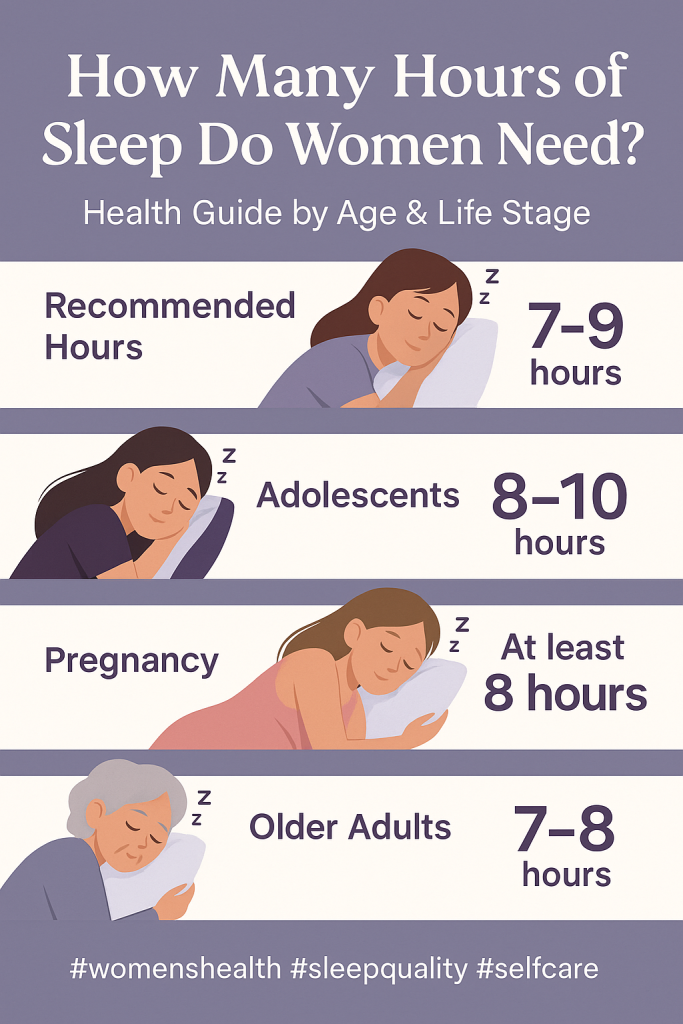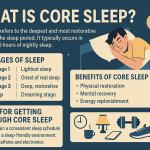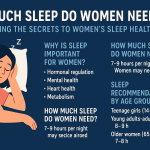Sleep is a cornerstone of well-being, yet many people underestimate its importance in leading a healthy life. For women, sleep needs may be different compared to men due to unique biological, hormonal, and lifestyle factors. In this guide, we explore how many hours of sleep women need, why their needs might differ, and how women can optimize their sleep for better health and vitality.
Understanding Sleep Needs: The Basics
Sleep is not just about the number of hours spent in bed. It is a complex process involving various stages that restore both the body and mind. The Centers for Disease Control and Prevention (CDC) generally recommend that adults aim for 7-9 hours of sleep per night. However, those recommendations can vary based on age, health status, and gender.
Recommended Hours of Sleep for Women
- Young Adults & Adults (18-64 years): 7-9 hours
- Older Adults (65+ years): 7-8 hours
- Adolescents (14-17 years): 8-10 hours
- Pregnant Women: May need more than 8 hours to support overall health and fetal development
Why Do Women Need More Sleep Than Men?
While the general sleep recommendation applies to both sexes, several studies indicate that women may actually need slightly more sleep than men. On average, experts suggest that women require about 20 minutes more sleep per night. Here’s why:
- Hormonal Fluctuations: Menstrual cycles, pregnancy, and menopause lead to hormonal changes that can disrupt sleep and increase the need for rest.
- Multitasking and Brain Activity: Research shows women often engage in more multitasking and have greater brain activity in certain regions, leading to a higher need for restorative sleep.
- Sleep Disorders: Women are more prone to insomnia, restless leg syndrome, and other sleep disorders, especially during pregnancy and menopause.
- Mental Health: Anxiety and depression, more common in women, can increase sleep requirements due to their impact on the body and brain.
How Sleep Needs Change Throughout a Woman’s Life
A woman’s sleep requirements are not static—they shift significantly during different life stages. Let’s explore how sleep needs evolve:
1. Adolescence
Teenage girls need about 8-10 hours of sleep. Hormonal changes and early school start times can make adequate rest challenging.
2. Reproductive Years
Sleep needs stabilize at 7-9 hours, but menstrual cycles can cause temporary disruptions due to symptoms such as cramps, bloating, and mood swings.
3. Pregnancy
Fatigue is common, especially in the first and third trimesters. Pregnant women often require more sleep, sometimes up to 9-10 hours, due to physical and emotional demands.
4. Perimenopause and Menopause
Hot flashes, night sweats, and mood disturbances can impair sleep quality. Even if time in bed remains the same, sleep fragmentation may lead to increased fatigue, making restful periods all the more important.
5. Older Adulthood
While the amount of sleep needed may decrease slightly, achieving restful sleep can become more difficult due to medical conditions and changes in circadian rhythms.
Consequences of Insufficient Sleep for Women
Chronic sleep deprivation can have serious consequences for women’s health and daily functioning. Some of the risks include:
- Weakened Immune System: Less sleep means your body has less time to repair and defend itself.
- Hormonal Imbalances: Lack of sleep can exacerbate PMS, worsen menopausal symptoms, and disrupt fertility.
- Mental Health Issues: Increased risk of anxiety, depression, and irritability.
- Weight Gain: Disrupted sleep affects hunger hormones, leading to overeating and potential weight gain.
- Heart Health: Poor sleep increases the risk of heart disease, high blood pressure, and stroke.
- Reduced Cognitive Performance: Impaired memory, slower reaction times, and decreased concentration.
Factors Affecting Women’s Sleep Quality
The quantity and quality of sleep women get can be influenced by numerous factors:
- Stress and Anxiety: Juggling family, work, and personal commitments can increase stress and disrupt sleep.
- Chronic Pain: Conditions such as migraines, fibromyalgia, and back pain are more prevalent in women and can interfere with sleep.
- Sleep Disorders: Sleep apnea and insomnia are often underdiagnosed in women.
- Lifestyle Choices: Irregular sleep schedules, excessive caffeine, and lack of physical activity negatively impact sleep quality.
Tips for Improving Sleep Quality in Women
Knowing how many hours of sleep women need is only part of the equation. Quality is equally important. Here are practical tips to help women achieve restorative sleep:
- Establish a Consistent Sleep Schedule: Go to bed and wake up at the same time every day, even on weekends.
- Create a Relaxing Bedtime Routine: Activities like reading, taking a warm bath, or practicing meditation signal to your body that it’s time to wind down.
- Prioritize Sleep Hygiene: Keep your bedroom cool, dark, and quiet. Limit screen time before bed to reduce blue light exposure.
- Monitor Diet and Exercise: Avoid large meals, alcohol, and caffeine close to bedtime. Regular exercise can help, but avoid vigorous workouts late in the evening.
- Seek Professional Help: If sleep issues persist, consult a healthcare provider specializing in sleep medicine or women’s health.
Frequently Asked Questions: Women’s Sleep Needs
Do women really need more sleep than men?
Research indicates women may need about 20 minutes more sleep per night than men due to greater brain activity and multitasking, as well as hormonal fluctuations.
How many hours of sleep do pregnant women need?
Pregnant women often need 8 to 10 hours of sleep per night, especially in the first and third trimesters, to support their changing bodies and developing babies.
Can sleep needs change with age?
Yes, sleep patterns and needs shift throughout a woman’s life due to puberty, pregnancy, menopause, and aging.
What if I can’t get enough sleep?
While occasional sleepless nights are normal, chronic sleep deprivation should not be ignored. Focus on improving sleep hygiene and seek professional help if needed.
Conclusion: Prioritize Sleep for a Healthier You
Understanding how many hours of sleep women need—and why—is crucial for overall health and well-being. While the recommended range is typically 7-9 hours, individual needs may vary based on life stage, health status, and personal circumstances. Prioritize both the quantity and quality of your sleep to improve physical health, mental clarity, and emotional balance. A well-rested woman is empowered to excel in every area of life!


